This post is here to help if you have a toddler not eating. It’s common, stressful, and often, can be explained. Here’s what’s normal, and what’s not so you can improve the situation—or at the very least, relax.
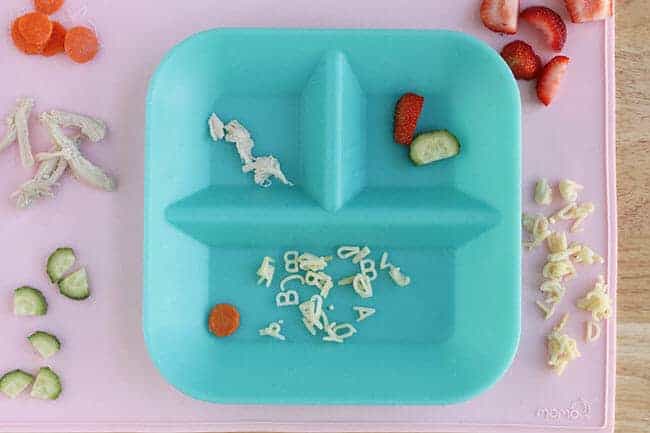
Toddler Not Eating
You get everyone to the table and bring out the food. Your toddler won’t eat, throws a fit, or fusses. No matter how hard you try, this is often the reality of feeding toddlers. The good news is that a toddler not eating is actually quite normal.
The bad news? It’s difficult to know exactly why your toddler isn’t eating—and what exactly you should do about it. But there are simple steps you can take to improve the situation.
Family meals are a chance to be together at the end of a long day, to enjoy food, and to create rituals and routines. But when a toddler won’t eat, whether at the family table or not, it can wreck even the best of intentions. And it can make mealtime a huge source of stress.
The reasons a toddler won’t eat are unique to each kiddo and situation, so I’m going to try to be as comprehensive as possible here.
Table of Contents
- Toddler Not Eating
- Daily Toddler Nutrition
- Why does my toddler refuse to eat?
- How do I get my picky toddler to eat?
- Why did my toddler stop eating?
- What if a toddler won’t eat anything but snacks?
- Is it normal for my toddler to refuse to eat?
- My toddler won’t eat because he's sick. Should I worry?
- My toddler won’t eat anything but milk. Help!
- How can I increase my toddler’s appetite?
- Why won’t my 1-year-old eat?
- Why won’t my 2-year-old eat?
- Why won’t my 3-year-old eat?
- My toddler won't eat breakfast. Why?
- My toddler is constipated—is that why she won’t eat?
- Why does my toddler always want a bedtime snack?
- Frequently Asked Questions
- How do I know if my toddler’s eating problems are serious?
Your toddler won’t eat? Help is here!
Sign up for our email updates to get tips and ideas sent to your inbox.
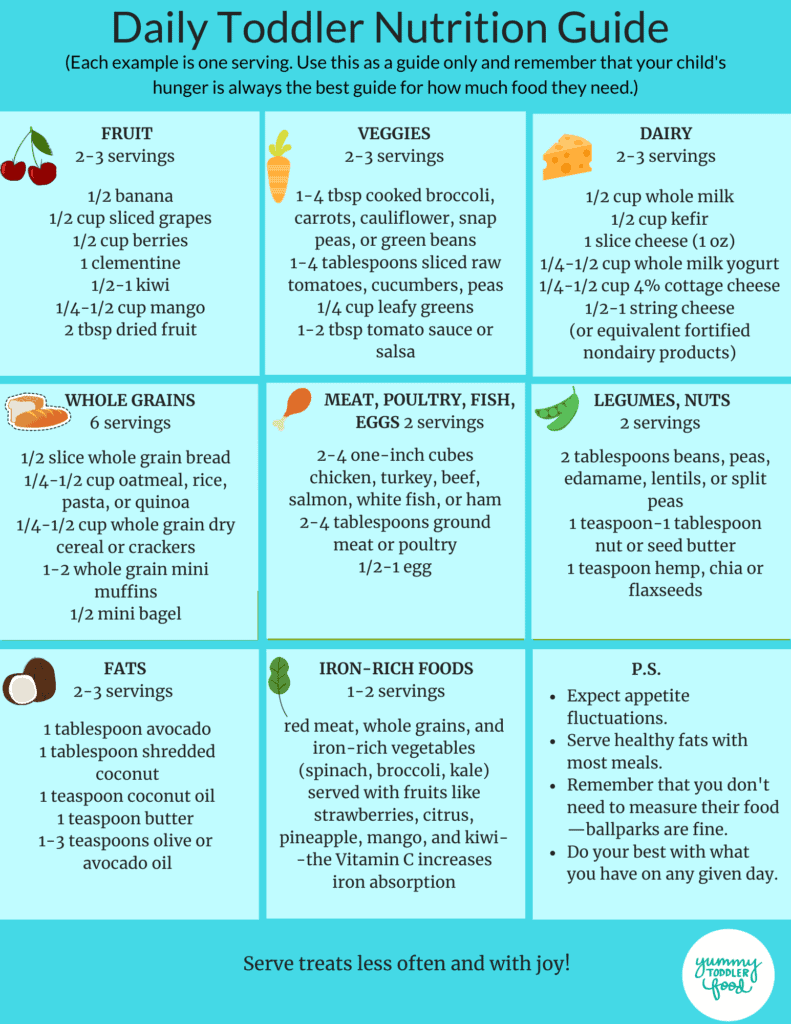
Daily Toddler Nutrition
For a quick reference, you can download my Printable Toddler Nutrition Guide so you can refer to it for reassurance and information. Use it as a guide, not a hard-and-fast rule, since kids aren’t robots and will not eat like a chart. I share this first because portion sizes may actually be a lot smaller than you realize and often we are simply overestimating the amount that our kids need.
(Aim to serve healthy fat foods with most meals or snacks, since little kids need those healthy fats for proper brain development.)
Why does my toddler refuse to eat?
This is the most important thing to consider: It’s very possible your toddler is not eating because he simply isn’t as hungry as he was when he was a baby. Toddlers grow less rapidly than they did as babies and may be less hungry and need less food than you expect. If you give them a larger portion size than they need, they may eat some and leave the rest—and it may visually look like they haven’t eaten anything even though they did.
Plus, toddlers don’t always have the words to effectively communicate that they aren’t hungry, so they may just refuse to eat. This may look like playing with food, throwing food, or flat-out refusing to have anything to do with food.
A normal toddler meal may be two bites of a food. Or it may be a whole plate. A normal toddler may like something immensely one week and not at all the following week.
This is to be expected and is 100% normal.
Or, it’s entirely possible that once toddlers have it in their head that they don’t want something, they won’t eat it. Sometimes not wanting dinner is about power. Toddlers are in the developmental stage where it’s normal for them to test boundaries. They are learning what they can and cannot do and the effects their actions have—both at the table and away from it.
Talk with the rest of your family about how to create structure around meals—when they happen, where they happen, who sits where, if music is playing, if phones are put away—to help your child know what to expect at mealtime. Toddlers thrive on routine and attention.
Try:
- Consider providing only water between meals and snacks (to avoid filling up bellies with milk or juice if that’s a potential issue).
- Serve very small portions to start to avoid wasting food or overwhelming the kids with large portions. Think a single piece of broccoli, one chicken nugget, or one small scoop of yogurt to start.
- Create some mealtime structure so there are set expectations at the table. This could be as simple as always sitting down at the dining table or the kitchen counter.
- Let it be ok if a child isn’t as hungry as you expect them to be. (The Division of Responsibility can be helpful here.)
product we love
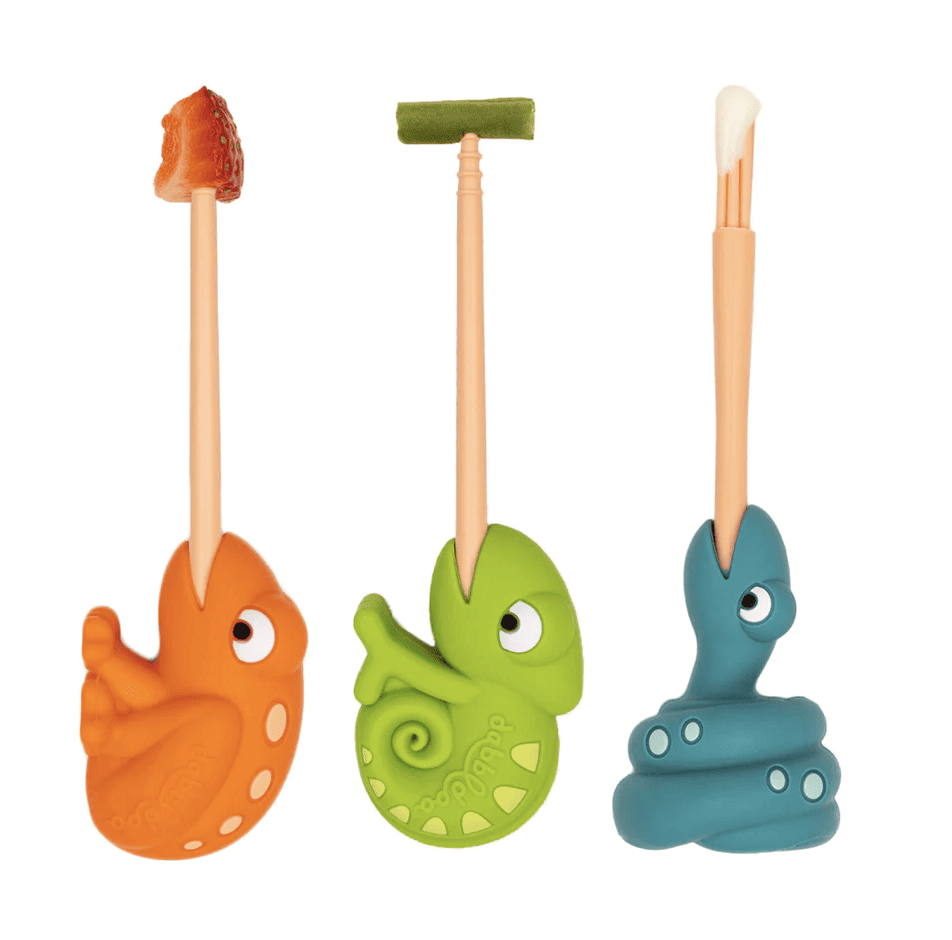
Dabbldoo Food Picks
Introducing a fun utensil can help your toddler relax and get excited about eating. Our favorite food picks are specifically designed to be safe and effective for toddlers. These are used by feeding professionals and parents to help kids explore and try new foods every day. (sponsored)
How do I get my picky toddler to eat?
There are a few ways to rethink this issue. First, if you are in the habit of short-order-cooking the foods you know your toddler will eat, you may want to consider stopping. Explain to your kids that we’re having such-and-such tonight but that you will make their requested favorite food soon. Then follow through so they know they can trust you!
Then, make sure there are one or two foods on the table that the child usually likes, even if it’s something simple like fruit or cheese. Surround those with the food you want your child to eat and let them decide what and how much of it to eat.
Using this Division of Responsibility in Feeding approach to meals can be a total GAME CHANGER, as it clearly delineates what the parent and child are each responsible for at the table, lessening pressure on everyone. It also gives the child a chance to stay in touch with their own hunger cues without prodding, pushing, or cajoling—which has the added benefit of helping to make mealtime more enjoyable for you, too.
We want our kids to know their own hunger and fullness cues so they know how much to feed themselves as they grow into adolescents and adults when we aren’t around. And those cues can be hard to tap into if they are constantly overridden by external cues (like if we push them to eat a certain amount), however well-intentioned.
You can also try to involve your toddlers in doing something to help get ready for the meal to distract them from their concern about what’s for dinner. Try letting them help to set the table, help with simple meal prep (like washing veggies), or wash their hands. Or, hand them an unexpected utensil to eat with at the table—a pair of mini tongs, a big salad fork, a tiny baby fork. That will allow them to engage with their food in a fun way, without creating more work for you.
If you are okay with cooking separate meals for your kids because it works better for you right now to know they will eat the food you make, then by all means do that.
But if you’re wanting your child to eat family meals and eventually eat more of the same foods as the rest of the family, then try the tips I just shared above.
Remember: Even if you follow all feeding advice “perfectly,” your child may still eat differently than you expect. That is normal.
It is incredibly difficult to accurately estimate someone else’s hunger. I am a big proponent of moving from the goal of “getting the kids to eat” toward “how can I make mealtime happier for all of us?”
TIP: Almost every toddler is “picky” in one way or another at some point. Toddlers are quirky—it’s part of the fun! (And the challenge, of course.)
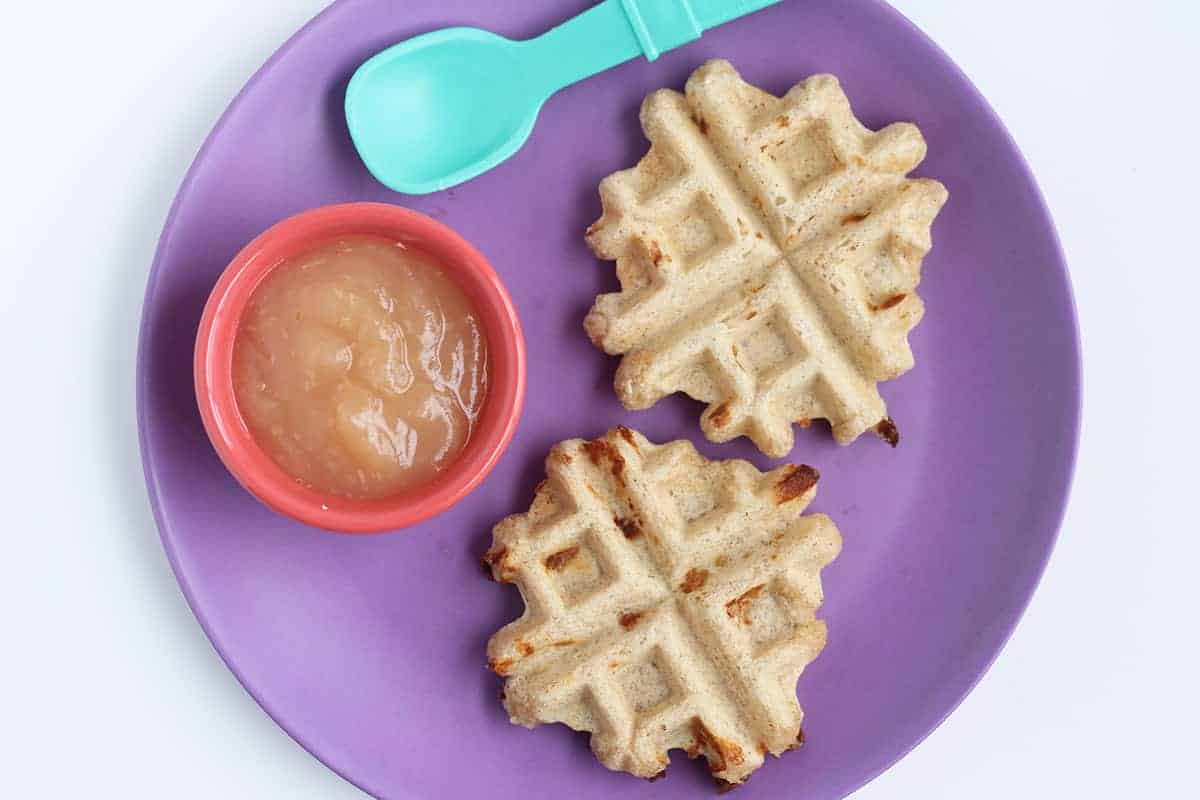
Why did my toddler stop eating?
First, if this is an ongoing issue, check with the pediatrician to make sure the child is growing, gaining weight, and meeting milestones. That is a solid baseline to know if it’s a serious concern or just run-of-the mill toddler life. If your child is playing with their food rather than eating it at the start of the meal, chances are they aren’t hungry enough to eat. Take a break and try again in 30 minutes if possible—or wait until the next snack or mealtime.
If your child just doesn’t seem hungry for any food or much food, consider how long it’s been since their last meal or snack, how much milk (or juice) they’re drinking throughout the day, how much they ate at their last meal or snack, and whether they’re teething toddlers or tired or otherwise off.
It’s very possible a toddler won’t eat simply because they aren’t as hungry as you expect them to be.
Or they may be hungrier earlier in the day and taper off with their intake as the day goes on.
If your toddler won’t eat foods he once liked, try serving them in new ways—such as cutting carrots into sticks rather than rounds before cooking them, but also remind yourself that it’s normal for toddlers to go through phases of loving and not loving foods. They may be obsessed with blueberries one week and not want them again for two months.
It’s possible they simply need a break from having certain foods as frequently. That is OK—and very relatable!
Try:
- Serve very small portions to start to keep your own expectations of how much they should be eating in check. Then, allow seconds (or thirds) according to the kiddo’s hunger.
- Space out meals two to three hours apart to allow time for hunger to build. And remember that their hunger may change during different phases of growth.
- Remember that there are simply times when kids aren’t hungry or aren’t as hungry as we expect. That is not a sign of pickiness; it’s just their way of telling us that they aren’t hungry at that moment.
- Make sure the food you are serving is easy enough for them to chew, so the food isn’t frustrating them.
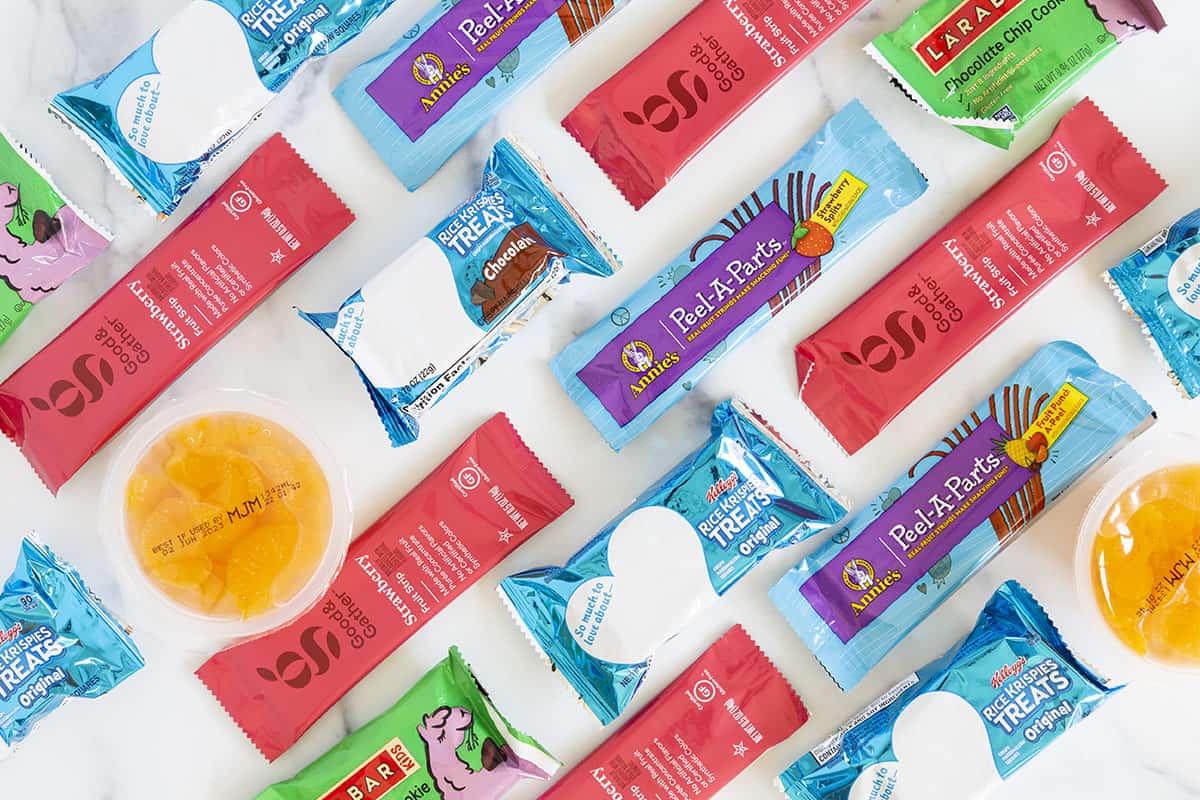
What if a toddler won’t eat anything but snacks?
Often, if a toddler knows there is a snack ahead that includes traditional “snacky” foods, they won’t eat the meal you are serving. It can help to serve “regular” food at snack time (instead of relying on crackers and fruit snacks) and to serve classic “snack” foods with meals. This can even out the appeal of all food intake opportunities.
In other words, think of snacks as mini meals and serve all types of foods at each eating opportunity.
Kids often relax when they have access to their favorite foods, so there’s nothing wrong with serving Goldfish crackers along with strawberries and a hard-cooked egg—or a chocolate chip snack bar with a banana and carrot sticks. It’s all good!
When it comes to feeding, the best thing you can do is to give your child lots of low-pressure opportunities to see (and maybe) eat a range of foods—while still offering foods you know your kids usually eat. It’s all about balance…for everyone involved.
It still counts as an exposure even if a child doesn’t eat a food. They can touch it, see it, learn what it’s called, and add to their food literacy—which can be helpful over time as they grow.
Try:
- Buy more of the foods you want your kids to eat, but include foods they love so they avoid feeling restricted.
- Serve small mini meals at snack time instead of traditional “snack” foods and incorporate more traditional “snacks” into meals—like crackers alongside soup, for example.
- Think of all eating opportunities as “mini meals” and serve all foods at all times to lessen the appeal of “snack” a little.
- Stick with a routine for meals and snacks by having them at set times (roughly) and avoiding all day grazing.
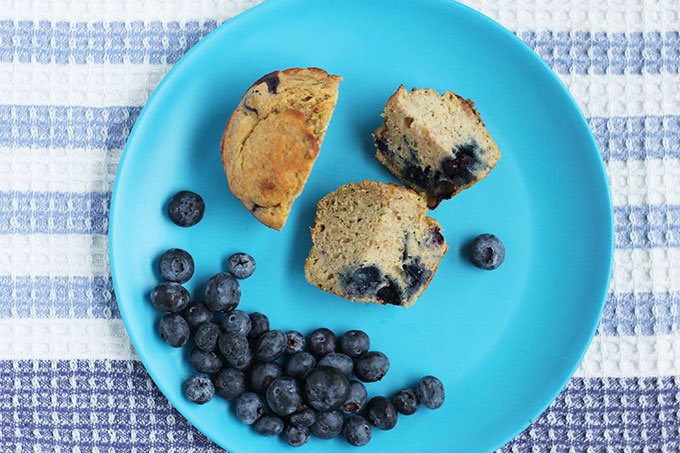
Is it normal for my toddler to refuse to eat?
There will be times when your toddler simply doesn’t like a meal you make. Whether it’s the texture, flavor, appearance, or the way the wind is blowing, we may never know the reason, but it will happen. Or, a toddler won’t eat at times because they are either not that hungry or they know you will get them something they prefer if they refuse.
A child will usually choose a more familiar, fun, and safe food when given the option. But if you pair safe foods with other ones, they can gently expand their accepted food range. Or, at the very least, have exposures to other foods (even if they don’t eat them yet).
My method is to make family dinner, including one or two foods per meal that the kids usually like even if those foods are a simple side of fruit and milk. Then, if they don’t want to eat, I can trust that they aren’t hungry.
This is a very reliable method if you do it regularly. I do realize this is hard when it’s 6 p.m. and your little one hasn’t eaten a thing for dinner. If that happens and they legitimately seem hungry after dinner, wait at least 30 minutes (so they don’t feel rewarded for refusing dinner) and offer a super boring bedtime snack like a banana. If they are hungry enough for boring food, you know they are hungry!
If your toddler seems to legitimately dislike a meal, you can institute a “backup meal” to give them the chance to satisfy hunger. Choose something plain that they would likely never choose to eat by themselves and offer that and that alone so you don’t have to negotiate in the moment. (To me, this is something that should be used very rarely since it can create more work, especially if you have multiple children.)
Good backup meal options in our house are plain yogurt with granola, plain toast with nut butter, a scrambled egg, or a bowl of cereal. We keep the options plain.
Try:
- Avoid getting up during a meal to get different food at your toddler’s request. Instead, aim to include one or two foods they usually like in any meal to ensure they always have something to eat.
- Ask the kids (who can communicate verbally) to choose between options for dinner, such as choosing which vegetable or side dish to have from two options you have on hand. Kids like to be involved in making decisions!
- Serve a boring bedtime snack if they didn’t eat dinner and seem hungry before bedtime.
- Have one boring “backup” meal option for those rare nights when they legitimately don’t like the dinner on offer—something they probably wouldn’t ask for but are happy enough to eat if hungry.
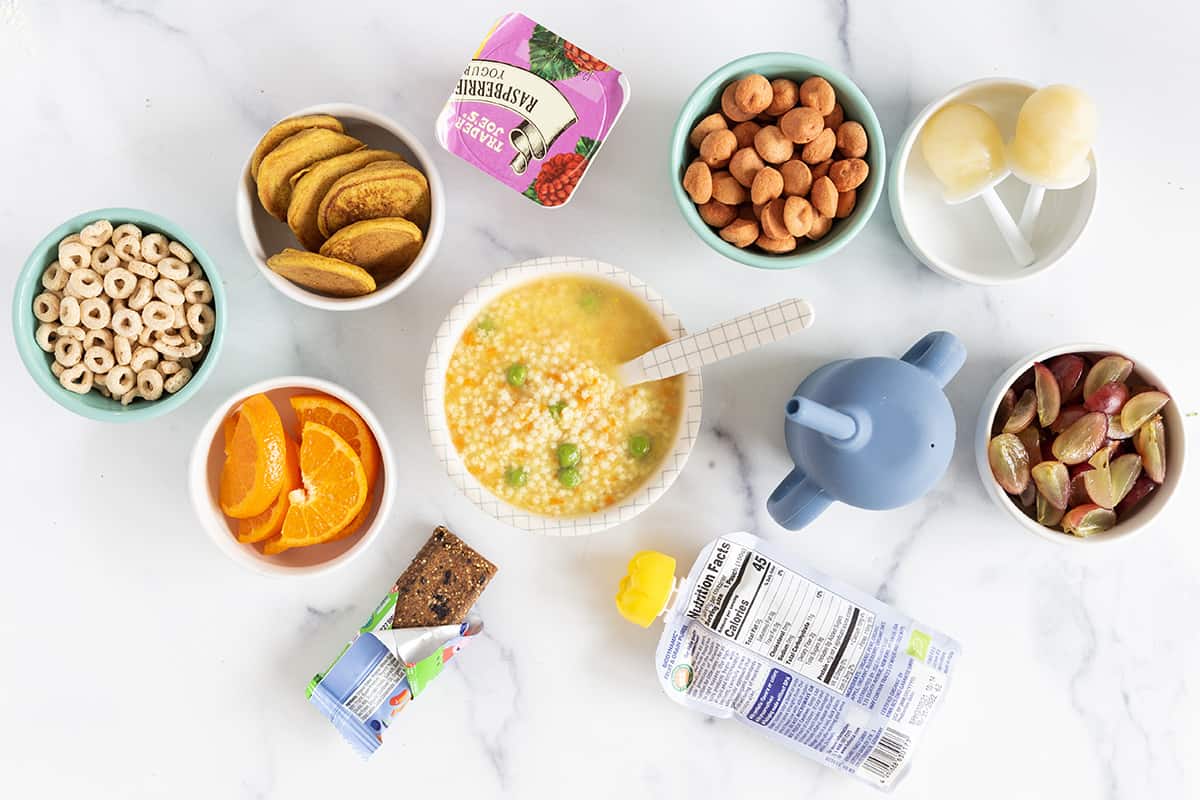
My toddler won’t eat because he’s sick. Should I worry?
When toddlers are sick, normal eating very often goes out the window. With any illness, appetites can decrease. The general rule that our pediatrician always shares is that as long as they are drinking and going to the bathroom normally, then you shouldn’t worry too much.
Keep portion sizes small, keep the actual foods simple, don’t push food too hard, and trust that their little bodies are doing what they need to feel better. You can get back to normal eating when they are feeling better, and you can always check in with your doctor. (Check out my list of best foods for sickness, too.)
Be patient since lower appetites can linger longer than you might expect, even once a child starts to feel better. And of course, check with your doctor if they aren’t drinking, there’s another red flag, or you just need reassurance from a medical professional.
Also, toddler teething can cause reductions in hunger. Try not to expect that your toddler will eat normally when they are cutting teeth (especially not with molars!) and instead offer them plenty of liquids, chilled foods, and things that don’t require too much chewing—toddler smoothies, yogurt for babies, Alphabet Pasta, Strawberry Popsicles—to help avoid irritating their already sore gums.
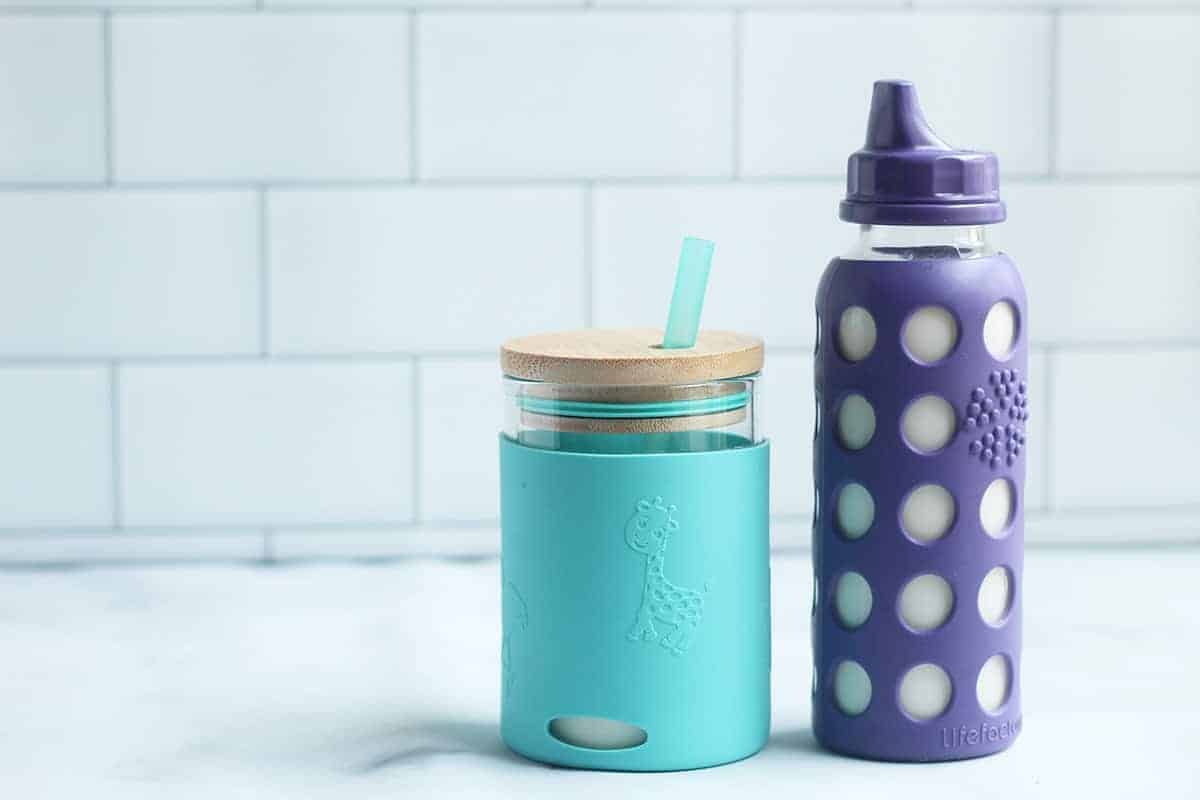
My toddler won’t eat anything but milk. Help!
If you have a toddler who’s not eating but drinks lots of milk, it’s possible that milk is filling their bellies and reducing hunger for other food. (The same can be said for any other food that they are insisting is the only food they want.)
The AAP recommends toddlers have two to three servings of dairy a day, which includes milk and other dairy foods like cheese and yogurt. A serving of milk for a toddler is ½ cup. Try serving a smaller portion of milk just at meals and offering water in between. (You may need to do this gradually, especially since milk is often a comfort food.)
Keep portion size in mind, especially if your toddler won’t eat anything but milk, since cups and bottles can be quite large. This 4-ounce sippy cup is a nice size to use at meals since it ensures that a toddler won’t fill up on milk and will be more likely to have room in their bellies for some food. A very small juice glass works, too.
You may need to taper down the volume in bottles to start weaning a toddler if that’s how they’re consuming their milk.
Try:
- Serve milk only at meals and offer water in between.
- Serve milk in a small cup (or a smaller sippy cup than you have been using) to help avoid serving too much at once.
- Start to decrease the volume of milk in bottles and work on moving milk to meals, rather than as separate feeding around 18 months.
- Remember that milk is often comforting for kids, so you may need to take a gradual approach with this.
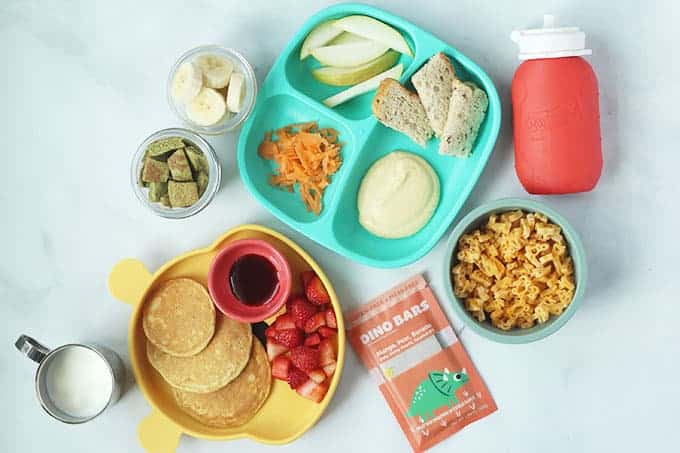
How can I increase my toddler’s appetite?
Why do you want to increase your toddler’s appetite? Are you worried she isn’t eating enough of the “right” foods? That she is “too small”? Is she low on the growth curve? A good question to ask is whether her growth is consistent with her own history, not as compared to other kids her age.
Every toddler grows at their own unique speed, and it’s possible she is exactly the size she needs to be—and is eating a perfect amount for herself in her current phase.
If your toddler truly doesn’t seem to be eating enough (remember, they may eat only a quarter as much as an adult does… you may need to adjust your expectations!) and there is a medical concern—such as if they have fallen off of their growth curve or are losing weight—you can try serving smaller snacks and meals more often, adding lots of healthy fats to their food, and getting them involved in the kitchen.
Here are some foods that may help a toddler gain weight, including my Kids Weight Gain Shake, Chocolate Protein Shake, and
Sometimes just being around food in a situation without pressure can encourage a kid to explore and enjoy more at the table, too.
Be sure to check with your pediatrician to make sure you’re on the same page about a plan if there’s a weight-loss issue.
Why won’t my 1-year-old eat?
Toddlers don’t grow as rapidly as babies, so while your child may have eaten a lot as an older baby, he might not be as hungry now. This is very, very common in 1-year-olds.
One-year-olds are also BUSY. They have a lot going on in their little worlds and many constantly want to be moving.
Avoiding distractions at the table can help a toddler focus on their food, and keeping a consistent mealtime routine—when meals happen, where they happen, and what’s generally expected during a meal—can go a long way toward happier mealtimes for everyone.
One-year-olds are also just discovering that their actions have consequences, so they may not eat (or they may throw food or do all sorts of other behaviors) simply because they’ve realized that they can. Keep your reactions during meals as low key and consistent as possible so they don’t try to get you to react. (I fully understand that this is really hard.)
(My favorite recipes for 1-year-olds may help give you some easy ideas, though.)
Try:
- Limit distractions at the table, and sit and engage with your child during mealtimes, as is possible.
- Keep your reactions to undesired behavior neutral, consistent, and swift. (If they throw food, end the meal or at least take a break; if they spit out their milk, remove their access to milk; etc.)
- Give toddlers time to work up an appetite between meals—and avoid letting them graze all day (or at least acknowledge they are getting their calories throughout the day that way).
- Remember it’s NORMAL for a 1-year-old to be less hungry than they were as a baby. They may eat less than they used to, and we might need to adjust our expectations. This often shows up around 14-17 months; it is not “pickiness”—it’s a normal decrease in hunger.
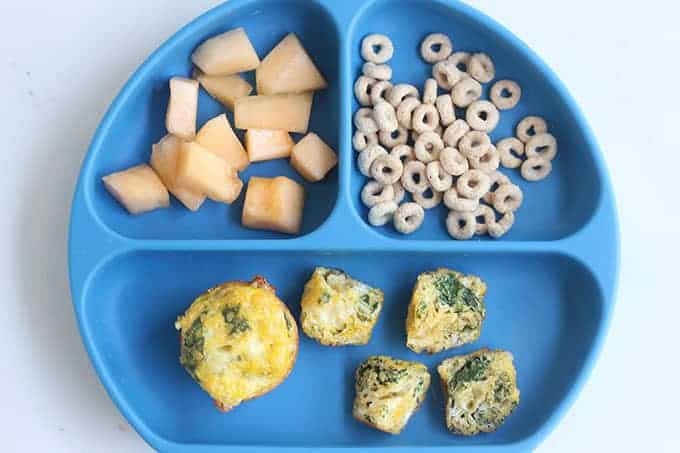
Why won’t my 2-year-old eat?
Outside of illness or teething, a 2-year-old won’t eat for similar power dynamics as above, but they also may be much more sensitive to new foods due to a normal phase called neophobia. This fear of new foods, which usually spikes between 2 and 6 (though it can start at 1 year old), can cause them to refuse foods they once loved and foods you think they will love.
It can also cause them to refuse to want to eat foods mixed together or foods with certain textures.
Try to remember that this is a normal phase of development that will, in all likelihood, pass eventually. Researchers have found you may need to offer a food 8 to 15 times before a child may willingly try it. In other words, keep offering the foods you want them to eat regularly in small portions and without pressure, and eat those foods in front of your child.
Because even if they don’t want it today, one day they just might surprise you some day in the future.
(Two of my kids literally refused beans for two years at our weekly taco night. Then one day, they each decided to try them. It took forever, but it wasn’t really a big deal—since they had other foods on the table during those meals they could eat—and they got to that food in their own time.)
For 2- and 3-year-olds, serving family-style meals can also help to diffuse power struggles at the table. Simply put the components of the meal in bowls on the table and encourage and help your toddler decide what they’d like to eat. Don’t force bites of everything, unless your child responds positively to that approach, but give them space to choose what looks appealing.
This small amount of ownership over what goes onto their plate can be extremely helpful for strong-willed toddlers. A lot of times, all they really want is to feel like they have some control over their lives.
Try:
- Ask your child “how can I make this yummier?” to see if they can help you figure out how to make their food more appealing.
- Serve family style meals to diffuse power struggles and let them choose which foods to put on their plates.
- In each meal, include one or two safe foods they usually like to ensure they always have something to eat if they are hungry.
- Trust their appetites, which may be different than you expect and may vary a lot from day to day.
Why won’t my 3-year-old eat?
A 3-year-old may not eat for reasons similar to a 2-year-old, but they may also have more words to express themselves—so they may be more dramatic in their response. They may not be as hungry as you expect, their appetite may be unpredictable, or they may be worn out by the time dinner rolls around. (That last one is fairly common!)
Three-year-olds also know how hard they need to push to get what they want. Toddlers at this age benefit from set expectations at mealtimes and routine. Which is to say, if you start getting up to get them foods other than the ones you’ve made for dinner, they will continue to demand that you do that.
There’s no rule that says that a toddler needs to eat every single thing you serve for dinner. If they eat some of it, there’s decently good behavior, and minimal crying, that can be defined as a happy meal. Keep the bar low, my friends, and you might find that things are better than you realize!
Try:
- Serve family style meals and let them choose what to eat from the foods you put out.
- Let them choose what to have for dinner from two predetermined options so they feel like they have more power.
- Serve very small portions to start to avoid overwhelming them.
- Include one or two safe foods they usually like in each meal to function as safety nets in case they don’t like the main dish.
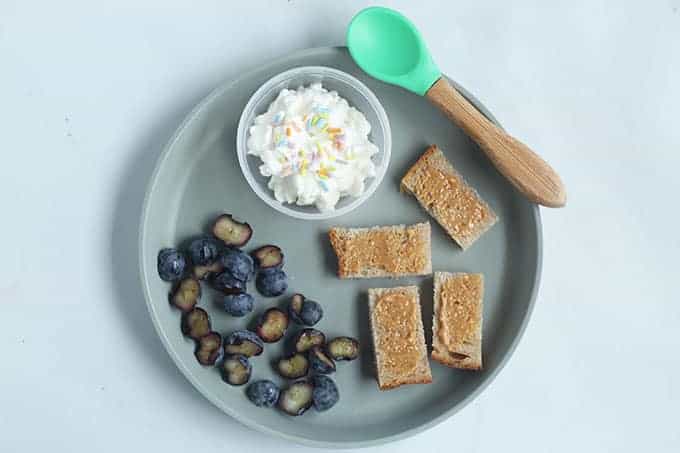
My toddler won’t eat breakfast. Why?
You may simply have a child who isn’t super hungry first thing in the morning. Try to give them a little time to wake up before sitting down for breakfast and/or serve a smaller portion for toddler breakfast and increase the amount of the morning snack.
If your toddler drinks milk or breastfeeds in the morning, it’s possible they have a full little belly that doesn’t have room for food. Keep that in mind if your toddler won’t eat breakfast and adjust expectations accordingly—and perhaps also serve smaller amounts of food.
My toddler is constipated—is that why she won’t eat?
It’s certainly possible! If a little one (or anyone, really) feels uncomfortable in their belly, the idea of putting food into it may not be appealing. In addition to fiber, having enough water is key to alleviating toddler constipation, so offer lots of water to drink throughout the day, along with hydrating produce like melon, cucumbers, berries, and zucchini.
You can also try to include healthy fats (avocado, coconut oil) in their diet, or try a Constipation Smoothie, as they, too, can help food more easily move through the digestive system. And remember: Each kiddo has their own “regular,” so it’s possible that your toddler needs to go once every two or three days…or three times a day.
If your toddler has been holding it all day at school, he may not want to eat dinner because he’s uncomfortable. Try to give him a chance to use the potty, with as much time as is needed to relax, before dinner.
Why does my toddler always want a bedtime snack?
If your toddler has some time between dinner and bedtime, she very well might be hungry before bed. You could either push dinner back a bit or institute a regular bedtime snack. This is a tactic I read about in a book and it makes sense.
If there is always an easy bedtime snack, you won’t have to renegotiate it every night. And you also won’t have to worry about sending your child to bed hungry if you are prone to that particular concern.
I’d just caution against making the snack something they LOVE because kids may recognize that they can simply skip dinner and have the snack they love instead. If a child regularly asks for a snack right after dinner, it may be a habit (or a bedtime delay tactic!), not true hunger. Try “you can be hungry for breakfast” or “if you’re really hungry, you can have a banana.” Both of those phrases can work wonders to suss out true hunger.
Try:
- Find super simple healthy bedtime snacks in this comprehensive post.
Frequently Asked Questions
Always check with your pediatrician with serious concerns and consider if the amount of soiled diapers has decreased, if there is an issue with growth or weight gain, if they are missing milestones. Or if something just seems off to you as their parent.
First consider whether it’s possible that they simply are not hungry. Then, offer an easy way to make the food yummier, such as a dip. Sit and talk about other things and know that not every kid likes every food.
Many do, though it’s usually simply being less hungry than they were as compared to when they were babies since their rate of growth typically slows.
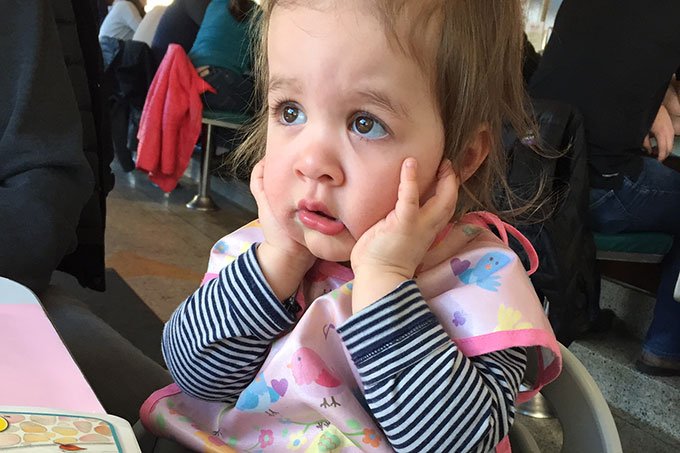
How do I know if my toddler’s eating problems are serious?
Here’s some great advice from Katja Rowell and Jenny McGlothlan, the authors of Helping Your Child with Extreme Picky Eating:
“Ask yourself: What is your underlying fear? The point is to figure out what you are worried about, and then find out if you need to worry (or not) from a book, a doctor, or dietitian. If you don’t need to worry, you can direct your energies to more productive things like supporting your child’s eating. If a problem is discovered, like an oral-motor delay, then you can get that addressed. Studies suggest that between one- and two-thirds of all young children will be described as ‘picky’ in early childhood.”
If there is a growth delay, severe reactions to different or toddler texture aversions, regular gagging, difficulty eating or digesting, oral-motor delays, muscular disorders, or any other issues that make eating difficult, reach out to your pediatrician and/or a feeding therapist. They will be best suited to help you work through the issues.
Bottom line: When a toddler won’t eat, it is not a judgment on our cooking skills or our parenting skills. A lot of it has to do with the developmental stage they are in—of learning and exploring boundaries—and simply seeing how much power they have. Hang in there!
Related Recipes
Did I miss anything? Comment if you have a question!
This post is not meant to be a substitute for medical advice. Please consult with a pediatrician or a feeding therapist as needed.
This post was first published April 2018.
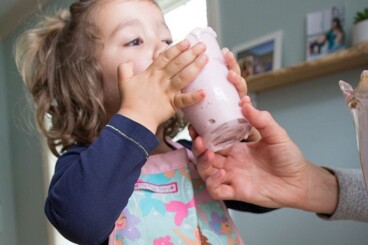
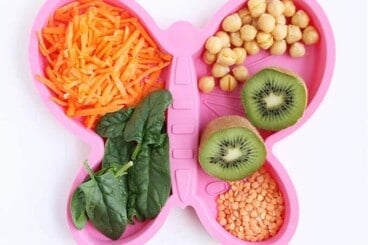
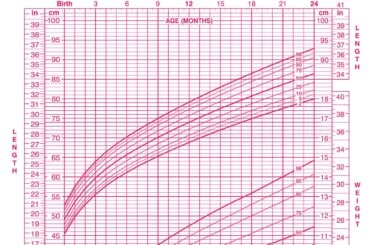


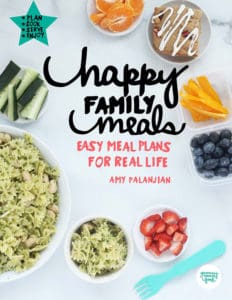

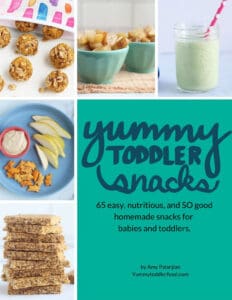














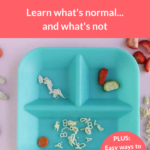
My 20 month old will only eat a small rotation of the same foods over and over again and will not try anything new regardless of repetitive offering. Would you consider this pickiness or perhaps a bigger issue? I considered seeking outside help but what can a therapist do that we haven’t already tried?
Hi- It depends. Other things to consider include: Are they growing, gaining weight and meeting milestones? Do they seem fine otherwise? Are there any specific noticeable texture challenges? Is it possible that they are simply not as hungry as they used to be? What is the total number of accepted foods over the course of a week? This age of 1.5 is a very classic time to see this behavior because growth often slows compared to babyhood, they are more aware of their own power to say no, and they are clearer on what they like. It may be a phase or it might be a sign to see what things you can do to help. But looking at the broader context will help.
Hi Amy – love your cookbook and site! Hoping to get you opinion on the difference between snacks and dessert (like a Yasso bar) – I like the suggestions on bedtime snack ideas. I have a 3 and a 5 1/2 year old. If they are not hungry or don’t eat a lot of dinner – which seems to be a lot these days with camp and the heat – (even with a few safe foods in there), what do you think about when they then ask for dessert? I don’t want to make sweets seem like a restricted food, and I would never say you have to eat dinner to get dessert, but I’m trying to think about how to be as sane as possible for them about understanding their hunger and navigate that scenario (which seems to be coming up even more in summer when ice cream and popsicles seem like a great idea on hot nights). Always appreciate your insights so would love to hear any thoughts! Thank you!
Hello, how do I get your snack recipe
You can use the search to find what you’re looking for.
Great article thank you for sharing.
Our 3 year old almost always refuses dinner or any meals made. Will only eat snacks or things from a package :/ I do try not to stress about it because she’s healthy, growing, and I’ve Learned to let them listen
To their bodies. Sometimes I fed her in the bathtub!!!! And she’ll eat the whole Dinner there, even if she refused to even look at it at actual dinner time.
I try to at least buy healthier snack foods, or:Made Good (there’s hidden veggies in)
But lately sometimes she’ll wake up in the middle of the night (~3am) and be hungry because she refused dinner that evening. At this point her go to is always the Made Good bar, or a banana. Once she has that she will happily go back to sleep. I kind of feel this is forming a habit but I’m not sure what else to do? I don’t think saying “you can be hungry at breakfast” would work for her.
Hi- Have you tried offering a snack right before bed?
Hello,
Thank you for this in-depth article. Definitely a few tricks I plan to try!
A couple questions for our scenario (and maybe another mom out there is wondering too):
My daughter is 23 months old. For the past couple months dinnertime has been our struggle. She won’t eat/stay at the table long or eat much. Sometimes she will eat a little more if we let her sit on the couch with the TV on or I even have to spoon food it to her for example. I know the TV/couch are not ideal but it’s about 10 feet from our dining table and after trying at the table on a weeknight this momma is tired (currently pregnant with daughter #2).
Overall, she eats fine for breakfast and lunch plus snacks. She does love her milk and I’ve been trying to cut her back on that. We still use transitional bottles (first one in the morning and a nighttime one). These are her favorite kinds of bottles. But I do want to get her off of these soon as she’s almost 2 years old. I would estimate she has about 5 ounces in the morning, 5 ounces around 7:15 pm and then she probably has some during the day. I’m not sure how much she drinks at daycare but she does not get this specific bottle there. I would guess/estimate she’s drinking around 15 ounces of milk a day. Possibly a little more. She also eats a yogurt pouch daily and usually a string cheese too. Right now, she seems to be getting molars (we think) so it’s been a very bad week for dinner (and sleep)!
After reading my long-winded backstory for where we are at right now, what tips do you think would be the most helpful or impactful for us right now? Maybe I just need to accept she’s not that hungry for dinner (she will usually snack on fruit or crackers about an hour after I offer dinner). But I can’t help but think her more frequent overnight wakeups are partially due to hunger.
Thank you!
Chelsea
Hi- Generally speaking, it’s very normal for kids to eat less at dinner so given what you describe with her intake over the course of the day, it’s totally possible that’s what’s happening here. With the bottles, you could try moving the ones at home to be served with meals instead of separate from them. Or, start by changing to a sippy cup (let her help choose it, make a big deal of changing to a big girl cup if you think that might help her). It doesn’t sound like the total volume of milk would be considered “too much”, but moving those servings to be with meals could help transition away from the bottle being a stand alone snack or meal if that makes sense. Also: Do what you need to right now given your energy levels. That is always valid too!
My grandson will not try anything that’s unfamiliar to him we’ve tried everything but he just goes into a meltdown. He’ll he boxed Mac & cheese, bananas, Dorito chips, applesauce in the squeeze packs, and gummies, but they have to be a certain brand or he throws a fit! He’s going to be 5 this November still isn’t fully verbal due to an oversight of tongue tie until he was three. So he’s way behind where he should be, in milestones. I’m the grandma but I need to find a way to get him the help he needs! What can I do?
Hi- If that is the complete list of his accepted foods, it may help most to work one on one with a responsive feeding therapist. You could ask your pediatrician for referrals to someone in your area to start. It may help to see if there are ways to give him more control over choosing his foods in the interim to help avoid the meltdowns, so include one of his safe foods and then a choice of two other foods that he can pick from. This won’t be magic, but it may over time help him see and learn about other foods. I am sorry this is so hard.
Great article! My 1-year old is showing all of the behaviors you mention. It’s so hard not to get up to get his favorites (blueberries!) so that we know he’s eaten SOMETHING. If I end the meal when he’s showing that he’s not interested/hungry, what suggestions do you have for him being cranky shortly after because he’s hungry (even though he won’t eat the food we’ve served)?
I think it may depend. I would try to include 1-2 foods in the meals that he usually likes (even if it’s not always the absolute favorite) and then some options might be: Save some of the food and put it aside for him if he changes his mind and offer that after if he’s hungry. Remind him that we can have snack soon, but we’re going to go do this other thing now. If it’s dinner, you can have one basic bedtime snack option that’s always available that’s not terribly exciting but is a chance to eat if they are hungry. We do a banana in our house. There’s no one size fits all answer since it depends a lot on the context, but I hope that helps a little
My nearly 4 yr old had severe acid reflux up until age 3. Food is not a joy for him even though he loves to cook and help prepare meals. He will only eat plain pasta,noodles & chicken nuggets or snacks. How can I get him to try more foods, he won’t eat any fruit/vegetables or meat. How can I get him to try more foods?
He may need time to become more confident around foods that once caused him discomfort. You could try letting him interact with more foods away from the table (choosing produce at the supermarket, helping to wash things, helping to prepare foods to cook) as a safer place to start. A feeding therapist may also have helpful options to help him work through some of this too.
This is a great article. Very complete and informative.
I sent this to my husband, he thinks i have to season the food more in order for our baby to eat it. He is 18 months old and some days he just barely touches the food.
It’s possible that flavor may help, but also remember that 18 months is a very common age for appetite to decrease as compared to how it was previously as growth slows down compared to babyhood. So it’s possible that he’s in a phase of being less hungry and it may ebb and flow as he grows.
Hi,
My son who is 1year 10 months old only depends on breastfeeding. Earlier he used to eat small portion of yoghurt and rice blended but now he is more relying on breastmilk.. pls tell me if this normal.. I have tried all sorts of food.. but he doesn’t like at all.
Hi- It is not uncommon for one year olds to fill up on milk (whichever kind they may be having) and since appetite in one year olds usually goes down as compared to when they were babies since their growth slows, he may not be hungry for food if he’s breastfeeding a lot. You could consider playing with the order in which you’re offering both to see if food first might help him eat a little more. Or see if you can reduce how many times a day he’s nursing by one or two. He may be missing some key nutrients (such as iron) if he’s not eating many solids and he may not be able to adjust that intake on his own. You may also want to talk with your doctor if it continues. I am trying to be very respectful in not telling you to wean, but instead look at the volume of breastmilk over the course of the day and recognize he may need less in order to feel hunger for food. I know this is a hard phase.
My son turned 3 in October , and he use to eat everything up until the age of 18 months Now he will only eat fruit, cheese and dry cereal . He has milk before bed that i have even diluted with water , just cant get him to eat . We have been offering foods he use to like with things i know he will eat but its been more than 18 months and still no change
Should i stop snack times ? Or stop the fruit ?
We have done the “ im responsible for supplying the food , he is responsible for eating it “
It is getting so bad that hubby and i are arguing about it all the time . I wont bribe and i wont argue about eating at the table
This is such a great read, and opened my eyes to so much! My 2.5 year old all of the sudden won’t eat anything he used to, and definitely wont touch anything new. The only thing we can count on is fruit or cottage cheese (or anything sugary). Dinner especially is a huge fight. Going to try family style meals…hoping to see progress soon!
I hope it helps a little! (And also maybe remember that many little kids just aren’t as hungry as we expect at dinner so that may be part of what’s at play too, especially if it was a fairly sudden. Growth may have slowed a bit, which is normal.)
Hello 👋 my son is 2 and a half and I know this may sound crazy but he only eats Oreos, baby rusks and Cheetos and I have a 4 and a half old daughter who eats all kinds of food which a lot of homemade and fruits and all above because I make a lot of homemade but my son at some point did t eat anything so this all he took and ate for 2 years straight after getting off baby food me and my husband don’t know what else to do because he would cry for days we asked his pediatrician they say just let him cry he’ll want real food but he’ll hold off for days and I don’t think that is ok.
Hi- If those are really the only foods he eats, I would NOT serve him other foods and wait for him to just eat them because that is not a method that works for every child and is bound to exacerbate feeding issues (especially emotionally). I would ask your pediatrician for a referral to a feeding therapist as this sounds to me like what would be considered outside of the normal picky eating stage. If you’d like some online options, let me know and I can send them to you. I hope you find some help soon!
My 32 months daughter refusing eat any thing only she take yoghurt drink and refuse any thing else what can I do ?
If she’s really only eating one thing, I would check in with your doctor and also keep in mind that this could be normal if there’s something else going on like illness or a change in her routine of some sort.
My 4 year old start pre school and refuse to eat breakfast and lunch. Before school he would eat what I prepare. However, I notice since he start preschool he is not eating his lunch and refuse to eat much for breakfast. He stress the fact of not wanting to go to school and is not a happy camper at all. I made almost everything he like and cut up his fruits and still he won’t eat.’He has never been around anyone one other than family and this change is very overwhelming for him. What can I do?
This is so challenging, but is fairly common. I would try to stay in communication with his teachers, make sure that his food is familiar and easy to eat if you’re sending it, and try to offer a substantial breakfast and snack before and after. Hopefully it will settle down soon!
This is a great blog, thank you! Do you think a toddlers refusal or lack of interest in eating could be tied to separation anxiety?
It totally could!
My 17 mo. old just started daycare last week. We are on day 5, and she refuses to eat there, including familiar foods like cereal and fruit. For the most part, they serve her their meals, but even when we’ve sent substitutes due to allergies, she won’t eat those things either. She even refused goldfish at 3pm yesterday after not eating all day! I understand it’s a big transition, since she has been home for the first 17 months of her life, but I did not expect her to go on a hunger strike. Any advice?
Thanks!
Hi- I think that if she’s drinking and otherwise seems okay (other than normal clinginess that I would assume may also be happening around the edges of this transition) I would try to give it a few more days to resolve itself. And continue offering easy to eat snacks after she gets home. Usually this sorts itself out in 2 weeks or so in my personal experience and from hearing from other parents. You can also talk to the teachers to see if there’s anything they might suggest doing specifically at mealtime—helping to make sure the food is easy to eat for example. Teachers are usually clued into that and are trying to do their best so I really hope she starts to feel more comfortable soon. Hang in there to all of you!
My son 28 months old
He is a picky eater he touches everything and make sure it is crispy he doesn’t like any thing soft
He used eat rice with lentils ( our staple food ) but then he got sick for couple of days and his appetite became very low and it’s been a month now I have tried everything to get him back to normal routine but nothing seems working
He just eat plan bread no fruits veggies or protein
Need help
Have you talked to your pediatrician or asked for a referral to a feeding therapist? That would be an option if he’s really down to just eating plain bread.
My 2 year old will not eat solids or any food. He used to like blended fruits cereal and yoghurt for bread but he stopped taking any of that. He does eat any whole fruits or vegetables. I’ve tried apples, carrots, strawberries, kiwi and more but he plays with them instead of eat. He also doesn’t eat any snake like muffins or cookies. He pushes them away. I’m so frustrated because I’m a full time mom. He stays at home with my mother. How do I get him to snack, fruits and eat solids.
Hi- Given his age and what you’re describing, I would ask your pediatrician for a referral to a feeding therapist if that’s possible. I hope that helps.
My daughter is 2 and 8 months, she drinks milk in the morning, lunch, and bedtime, she is a very picky eater and only eats yogurt/ cheese stick for breakfast and rice, fries, chicken nuggets for lunch most of the time she takes 1 or 2 bites and asks for milk soon after. I tried taking the milk away but she still wont eat . were should i start to fix this?
Thank you so much !!
Hi- You could try moving the milk to be with meals to start, then gradually reduce the amount down to 4 ounces. Over time that would maintain her comfort food (milk) but reduce the chances that she’s filling up on it or using it in place of her meals. It can sometimes be a process to help kids out of that habit, but I went through it with my middle kiddo and it both took a while, she didn’t eat a ton of food (especially at dinner) for her 2 year old year, but soon after that she both stopped loving milk so much and started eating more. Some of what you’re mentioning could be happening even if she wasn’t drinking milk because of her age, but I hope adjusting when and how much milk is served helps a little. Feel free to email me if not and I can recommend some additional resources.
Hello,
My Daughter is 3 Years old. Not eating at all for more than a year, vomiting always while eating, and keeping in the mouth for a long time. tried appetite syrup also. for
P.s: stool is hard always and little portions.
If she’s vomiting while she eats, I would consult your pediatrician and find a feeding therapist to work with if possible as that is a severe reaction. I hope things improve.
My son is 20 months and a very picky eater. He literally only ever wants fruit. He will eat other food groups but it’s typically only 5-6 different foods. I’m at my wits end. He won’t even attempt to pick up a food if it’s not one of those foods he likes. I always put a safe food (which is a fruit because that’s all he wants) but if everything else on the plate is not what he knows he will only eat the safe food. He’s gone many meals skipped. Days where he only eats some fruit all day long. I’ve tried what feels like everything and I get nothing! I try to stay calm but it’s going on for weeks and weeks and I lost all patience. I fear he’s losing weight. But still has tons of energy. Any advice??
Hi- With this information, I would recommend that you look into a feeding therapist who can offer individualized suggestions. If you’d like suggestions for people who do virtual work, Thrive by Spectrum pediatrics is a great option. Hang in there!
My 19 months old has always been a picky eater. He never liked water. And now since past 3 days, he has stopped eating altogether. He just says “done” after seeing food. We tried giving his fav food ( chocolate cake) but he rejected it! He just throws around the food and kills his meal time and says “done”. He doesn’t want to drink any liquid except breast milk. We haves tried different cups, bottles, sippy cups, straws but he just doesn’t want to drink anything( not even juice/ milk shakes/ smoothies/ water)!
He is still active, happy and playing all the time. Rest of his schedule and activities are normal.
What do I do?
If he’s not eating, but is drinking breastmilk, that’s at least something. I would check in with your pediatrician though since that is out of his normal and they can tell you the signs to keep an eye out for if they’d want to see him. (Maybe he’s teething?)
Hello Amy,
My 19 month old Little Girl has not been eating right for the past 6-8 months, every single time something needs to go anywhere near her mouth it becomes a battle… 🙁
She used to eat quite nicely before, having fruit and veg, I was cooking nice little meals for her, it all stopped for no known to me reason around the summer…she has not eaten fruit or veg since (even the slightest chunk gets rejected), won’t eat cheese, any puree, soup, pasta, rice, cous cous, pies, etc. Bread only gets eaten completely dry – cannot put the tiniest bit of butter or jam/chocolate on it 😐 often she refuses yoghurt, which she loved…She used to eat porridge quite nicely for breakfast, now doesn’t – will eat cereal with milk tho, so I suppose I should be ‘happy’ with that… Lunch is another battle – he only thing she will eat without too much of a fuss is ‘dry, boring, brown oven stuff’, i.e. chicken nuggets, fish fingers, veggie sausages…no veg or potato (even in the form of a chip) will pass…
I don’t tend to give her biscuits/snacks in between, so that she is actually hungry for the more important meals, that doesn’t work.
We do sit to eat together, I show her I eat what I give her and try to incorporate other foods that she is refusing to eat on her plate, just so she sees they exist, but nope, no luck…
I am literally at the end of my sanity here, as this cannot be ‘normal’ to be happening every single day for the last 6/8 months…..
HEEEEEEEEEEELP!!!!(please!!!!!!!!!!!)
Hi- It sounds like you might benefit from more individualized help given how long it’s been going on and your stress level (based on what I can tell:). If you’re open to that, I recommend Thrive by Spectrum Pediatrics or Sunnyside Up Nutritionists. You could also look into the book Helping Your Child with Extreme Picky Eating by Katja Rowell. I hope that helps a little!
My 18 month old won’t eat any of the foods I give her unless it’s string cheese, or chips and all she ever wants to drink is juice, she won’t even try to drink milk or water…I don’t even know what to do any more do I just give in and give her juice? I don’t want her to go without liquids
Generally speaking, in this situation I would ask what you do when she doesn’t eat what you offer her and what her expectations are of mealtime. If she knows she can hold out for the food she wants, she’ll go with that. I recommend using the Division of Responsibility with consistency and including 1-2 foods in each meal/snack that the kids usually like and not getting up to get other food. This can take a few days to become normal, but it can help. With the liquid, maybe try watering down the juice some to start? I know this is hard!
Hi, I have a 18 month old, she loved puree’s since around 5/6 months old right up until around 9/10 months. Then she has never ever liked the lumpy food, with solids such as breakfast toast, porridge, she will have one bite and that’s it. We offer snacks such as fruit etc throughout the day but she doesn’t eat. All she wants is milk.
Hi- Generally speaking, it’s possible that she is full from her milk and that decreasing the amount she has over the course of the day could help her to be hungrier for solids. Some kids don’t connect the dots between solids being able to fill their hunger until they are drinking less milk so that could be the main or part of the issue here. I would continue trying to offer a range of textures though to continue to give her time to learn them and reach out to a responsive feeding therapist if you feel that the texture issues are more of the issue than the milk consumption.
My kid is 2.5 years girl .. she was 24 lbs her ribs stick out .. it’s disgusting she refuses to eat … truthfully I given up .. it’s exhausting if she doesn’t eat whatever .. they will eat one day right???
If she’s really not eating, I would recommend being in touch with your pediatrician as you may need to work with a feeding therapist. I hope that helps!
My 3 year old will be 4 in June. He has a very limited amount of foods that he will eat. Peanut butter, strawberries, banana, green beans, French toast, carrots, cereal, snack bars and sometimes eggs. I am concerned that he isn’t getting what he needs nutritionally but my pediatrician is insisting that he’ll eat something new when he is ready. He has gotten taller, but hasn’t necessarily gained weight in the last 6 months. When should I be concerned ?
Hi- Typically if a child eats less than about 20 different foods over the course of a month (two different kinds of snack bars would be considered two different foods, for example) you may need individualized help from a responsive feeding therapist. If preparing meals and snacks fill you with dread or worry, I would also consider that a time to consider individualized help. Kids don’t always grow linearly, so I would trust your pediatrician’s assessment on growth. I recommend the book How to Help Kids With Extreme Picky Eating, and also the teams at Thrive by Spectrum Pediatrics and the Sunnyside Up Nutritionists. Feel free to email me if you want to chat more!
My son used to be a great eater until about 18 months. Since then he has been extremely picky. He doesn’t eat foods that he used to (which I know you mentioned is normal in your article). Ultimately, I’m not too concerned about my son’s health since he will eat at least 1 or 2 foods from each food group. However, he almost always refuses to eat dinner. Again, I know he’s probably not hungry at the time; but what is concerning (or more frustrating) is that he wakes up at 5AM, and I think it’s because he doesn’t eat dinner. I always offer 1 safe food (if not more). He probably eats dinner once a week, and he’ll only fill up on the safe food. If we were to offer chicken nuggets or pizza, he would gobble it up every time. I’m wanting to just give in and give him nuggets and pizza every night so that he’ll sleep later in the morning (which I know I shouldn’t do). Any advice? We’ve been offering the same foods since he was 18 months (he is now 27 months), so well past the 15 times that is suggested to offer it before they actually try it. And when I say the same foods, I mean a wide variety of foods, but many times (e.g., we offer him chicken 2-3 times a week for dinner, fish another night or two, ground beef another night, etc.). We never pressure him to eat anything. I’m getting to the point though that I want to. Any advice would be appreciated!
It is very common for this to happen around the age you mention. Perhaps offer a very boring bedtime snack to help? (I cannot guarantee that will help with the sleeping—you may also want to look at how long he’s napping which could impact how much nighttime sleep he needs.) My approach to bedtime snacks can be seen here: https://www.yummytoddlerfood.com/bedtime-snacks/
3 year old refuses to eat anything other than chips and chicken nuggets for dinner. I make a different dinner every night and never give in to his demands, if he doesn’t eat his dinner he doesn’t get an alternative. It is slowly getting worse, to the point that he ate 1 dinner last week. I serve him things that I know he has eatten before but his not even eating them. I include him is the prep, we reward him for trying new foods and nothing is working. Someone please help us!!
If you haven’t worked with a feeding therapist before, you might want to get some individualized help if it’s getting to the point that he’s really not eating. I can send you some options if you’d like. I know this is hard and I also know that sometimes you really need someone to work with your unique situation.
I couldn’t figure out how to add my own comment..
My son is 16 months and I am sill breastfeeding him. My husband thinks I should stop because he still wants it at night and he thinks thats why he doesn’t eat well. Breakfast he never really eats much more than 1-2 bites unless we have pancakes. Should I stop breastfeeding? I know he loves it and I love the bonding but I know food is more important for them…
Hi- I can’t tell you what to do but I will say that clearly breastfeeding is important to you and you don’t have to stop if you or he isn’t ready. Yes, it is true that some kids who nurse overnight at this age will be less hungry for food simply because they’re getting nutrition from the breastmilk. If you want to nudge his intake towards more solids, you could consider night weaning or working towards dropping the first morning feed so he has time to be hungry for breakfast. It can be gentle and responsive to him and a process. I hope that helps. I can direct you to some resources about night weaning if you’d like—let me know here or amy @ yummytoddlerfood . com
Hi Amy,
Can you please share those options?
I am new in your blog and in USA and will be thankful for the info
Children are 4 and 2
Serving a balance of items and a safe. When they eat all the safe food and nothing else and want more safe food, what do you recommend? I’d like to have a go to approach because once they learn it they will be ok with it.
Ex: Pork Chop, broccoli, potato, apple sauce. They want more potato.
My current but weak approach is 1 more small serving and then we are done with the potato till next week. Still feels wrong. Either they stop eating asking to leave the table, have a fit at the table or eat a broccoli and meat so they can get more. I just don’t know. We’re all tired at dinner time.
(Other common safes are fries, strawberries or watermelon.)
Thanks.
What is your specific worry about offering additional potato? Perhaps try letting them have more and see if that helps make dinner less exhausting, just as an experiment? Meals are about more than nutrition (though I of course understand that is a concern).
The ‘half of their calories should come from fat’ might be the most frustrating thing to read. I’m actually really good at math, but I don’t know how to calculate nutritional math. And kind of don’t have the mental capacity to understand/take the time to learn it. If the nutrition community could find a different way to communicate these numbers, I would certainly appreciate it, and might be able to implement better nutrition in life.
Yes, that is a good point. Aim to include some healthy fats with each meal or snack, but don’t stress if it doesn’t happen each and every single time, and you should be fine. I will update the text to be more clear and helpful. Appreciate your feedback!
Hi Amy, my two year old refuse to eat for 6 months already. She only wants to drink her formula milk… please help.
Hi- If your child is only drinking formula and no solids, you need to reach out to your pediatrician and work with a responsive feeding therapist to wean off the formula and onto solids. That is a process that will likely need professional supervision, especially at the age of your child, so please try to get that medical help unique to your situation. Good luck!
My 20 month old used to eat very well then one day she stopped. I started noticing that’
she’d pick up the spoon or food to put it her mouth and then just stopped herself. Sometimes I can hear her tummy and I know she’s hungry. She sometimes picks up the food but sets it down and I don’t know if she can’t eat or if it hurts . this week she hasn’t really eaten except for a bit here and there. She doesn’t drink anything other than water or breastf milk .
Has she been sick or teething? If it’s been going on for longer than a few days and she’s not eating anything, I would check in with her pediatrician.
My 19 month daughter is not eating since two days
She drinks water but eat about 1 meal or 2 meals
She is teething. But i need to know when shall i get worried about her portions.
She looks tired, i dont know bec she is not eating well or because she goes to nursery
Thank you
My problem is my 2 year old will not lay down for bed or a nap without milk she will have a melt down even in the car she has to have milk therefore she never eats actual food she is by no means under weight but i go through 3 or 4 gallons of milk a week i dont know what to do!?
If you want to change the behavior, you’d need to have a plan to discontinue offering milk at those times and offer alternative comfort instead and to stick with it and be consistent with your reaction. If milk is interfering with her food consumption, she may not be getting the nutrients she needs from food so you could consider a multivitamin in the meantime. A sleep consultant might be helpful in this situation since the milk and sleep are so tightly connected. Alicia from http://hushlittlebirdie.com/ is wonderful. Good luck!
My 2.7 month toddler won’t eat except for the specific foods that he likes. He would not even open his mouth to try the new food as long as it doesn’t look like the one he is familiar with. Someone advised we shouldn’t give him another food until he tries what we offer . He ate last 12pm , it’s 5.13am now that I am typing this and he has still not ate. I feel bad and even though this person is a child care specialist I feel something is wrong with this approach. He keeps waking up to drink water but won’t eat the food. I am at my wits end. He won’t feed himself. I feel like I left things too late. I don’t know what else to do..
We don’t eat the same things because my husband and I are on specialized diet and he can’t eat what we are eating. My husband and I don’t eat the same things not out of your choice but out of necessity. Help me
Hi. I’m so sorry you’re having challenges. It sounds like you need personalized guidance from a responsive feeding therapist. I’d ask for a referral from your pediatrician or if you are interested in virtual services, let me know at yummytoddlerfood at gmail.com and I can send you some names. Hang in there!
Great article and I love your instagram page! I am having a lot of trouble stopping spoon feeding my capable 16 month old son. We start a meal and usually he will try to start eating something and then after a minute or so gets bored and I just feed him the rest. Sometimes he says done quickly but I still try a few more bites. I was always encouraged to finish my plate growing up and it’s something I have extreme trouble with (people leaving food on their plate.) Even typing this I am seeing the problem is me but how can I feel confident he’s eating enough? He’s a big boy too and smart but sometimes I feel like “why would he let me feed him if he didn’t want it?” I feel at a loss and that I’ve already failed my child in regards to healthy eating habits.
I would encourage you to simply stop feeding him if you really want to and/or definitely when you can tell he’s done and is giving clear signals. You’ll know he’s had enough if he’s growing, gaining weight, and meeting his milestones and if he’s happy and seems good to you. It gets easier the more you do it (though you may always worry and that’s normal too), but the good news is that every day they have a lot of chances to eat so he’ll never go long before he has another opportunity to fill his belly. Remember that kids eat a range of portions and that can vary a lot from day to day. There’s no one right portion size. Follow his cues like you are and trust yourself too. You are not failing! Also: it’s okay to help him when he’s having trouble with utensils. Let me know if I can help more too!
Thanks for the informative post! We are hoping to transition to eating dinner as a family more – our son is 2 and 2months, and really picky. So I’m ready for this to be challenging for a while, which is a shame because cooking and eating dinner is a pleasure my partner and I share and are loath to give up 😉 My concern is – if we put meal components out, won’t he just eat the ones he likes and leave the rest, ie. he would just eat carbs meal after meal? He already practically subsists on bread some days so I am worried this would do nothing to expand his tastes. Any tips? He’s frequently picky about texture (doesn’t like pasta) and mixed things (say, omelette with ham in).
Hi! I guess I would say that you don’t necessarily have to expect that mealtimes will be terrible. I would ask what your main goal from meals is—is it nutrition? Together time? The goal if offering a mix of foods and letting the kids have some say in what they actually eat is to lessen the power issues that often creep up in toddlerhood. So meals can be about being together versus a battle of wills. You can also plate their food, using small amounts if you prefer. Yes, little kids may eat more of some food groups than others (which is normal for their age, they actually need a lot of carbs!), but often times, if you keep mealtime pressure and stress low, things balance out over time and improve as they grow. This can also increase the likelihood that they will try foods on their own, without being forced to, which will make it more likely they’ll eat them again—and when they are old enough to be eating out in the world without you.By eating with you, he will also see you eat a lot of foods, which is helpful for exposure too. There are no guarantees, but this method is helpful for creating happier mealtimes for everyone. (Which I realize may not be everyone’s goal!)
I meant to add that you can also remind him that he can do it himself (even if it’s just with his hands) and sit with him to model eating. That is an important part of this since it’s helpful for kids to see how we eat so they know what is expected of them. And it gives you something else to focus on too, which might help. Hang in there. I still help my 18 month old when he’s having trouble with utensils—this is a long process of learning to eat and you 100% have nothing to feel badly about.
Thank you so much for responding so quickly I really appreciate it and am so grateful to your advice! I will be having my husband hold me accountable to stop and trust my toddler. I think one of the initial problems was I was always worried he would wake up in the night more and breastfeed more (we are still nursing and I’m hoping he will naturally wean by 2) but mostly he sleeps well. Thank you again I’ll reach out if we need more help.
My 2 year old often refuses his meal and says ‘cake’ as he knows that desert comes after! We’ve read conflicting things – either withhold desert if they don’t try their main meal, or don’t do this as it encourages them to think negatively about their main meal. We’ve tried both and also offering fruit only for desert but the behaviour is not changing. At nursery, they always offer desert regardless of whether the main meal is eaten and this does feel right with us, but we worry that we’re rewarding him for not eating his dinner! We have recently started a sticker chart where he gets a sticker if he tries his dinner but not sure that he has made the connection or not. Do you have any advice about whether we should give desert if he doesn’t try his main? By desert, we usually do fruit but occasionally we give home-made cake that he has helped to bake (no sugar) so we’re not giving massively exciting deserts, but I did wonder if we should mix it up and give fruit for snacks and then just something plain for desert like rice cakes?
There is no perfect way, but I prefer to offer dessert with the meal and let the kids eat it in any order they want so that there’s no chance that they’ll see dessert as a reward or better than the main food. I would also suggest that you pick a dessert strategy and stick with it—so maybe that means no dessert during the week, but ice cream on the weekends. Or a small portion of dessert each night. This lets the kids know what to expect and avoids having to renegotiate it each day. There’s more on serving dessert with dinner here.
My toddler asks for the same foods over and over and will even try and get new servings style half of the old serving is still right in front of her. This has only been the last few days, but she’s throwing giant tantrums when I won’t get her another serving.
It’s so hard when that happens. I would stay calm and remind her that she can have more when she’s done or that she can have more tomorrow, that you know she loves that food and you’re so glad she’s enjoying it. And do your best to change the subject to help her focus on something else. It’s possible she’s worried that there won’t be enough or she’s reacting to feeling limited. Depending on her age, how exactly you approach it can vary slightly, but I would do your best to reassure her that there will be more and not take it personally. Toddlers have very little control in their lives and so often mealtime dynamics are a way that they try to exert some!
My 13 month old has always given us a hard time with eating stage 2 foods. She would constantly whine through the whole meal. Now that we are trying real solid table food the whining and refusing to eat is even worse and is extremely frustrating. It’s frustrating because she will chew and swallow bananas in a banana split but she will chew and hoard buttered noodles in her mouth for the entire day unless I give her stage 2 baby food to swallow it with. What do I do?
Is she drinking water with meals? It takes kids time to learn to chew and eat a wide range of foods so I would try to be patient as she is still new at this and offer a food you know she can easily eat with at least one that is more challenging for her at each meal or snack. And do your best to make foods as easy for her to chew as possible. Like cut those noodles up into small pieces and make sure the banana is super ripe and soft. It should start to get easier but allow time for her to learn through this transition to solids.
There are so many articles out there on this subject and they all say the same thing and aren’t helpful. I do most of the things these articles talk about and none of it helps lol. My almost 3 year old just doesn’t want to eat anything but snacks and junk food. She will also tell me what she wants to eat and I make it or provide it and then she doesn’t eat it. But give her some chips and she will eat those right away. All the theories out there are a bunch of crap and don’t work
I would recommend that you read this https://www.yummytoddlerfood.com/the-division-of-responsibility/ which may address the part about who gets to decide what to offer kids. There is nothing anyone can say that will magically make a child a perfect eater or not like snack food (because it is delicious), but there are steps we can take to improve the mealtime dynamics, many of which I mention here. I hope it helps a little.
Hello,
My daughter is 2.5 years old and is never interested in food. Having any meal, may it be breakfast, lunch or dinner is always very stressful. She also does not have milk or any fruit juices either. Doctors recommend to have a variety of raw fruits and veggies. But we are far far away from it. Some days she shows interest in chicken or salmon. But if given regularly she again starts to deny it.
This is happening since she started her solid while she was a baby. Sometimes I just leave her alone with her food (while I am stressing about it in a different room) but the food is always untouched. Please help me with this situation.
It’s not that I keep offering her food every 5 mins. Instead we have only 3 meals (breakfast, lunch and dinner). Still she is never hungry.
Hi. With a child who shows no signs of hunger, I would recommend working with a feeding therapist. Look into https://www.thrivewithspectrum.com/ https://lutzandalexander.com/ https://www.pinneydavenport.com/ who all do virtual work with families.
Thanks for the helpful article! My question relates to our just turned 2 year old throwing food. I’m wondering if maybe our expectations for her portion sizes have not been reasonable and she’s just getting full and then bored so she starts throwing. But she often grabs food off her plate and throws it on the ground. Any suggestions?
I would recommend that you start with smaller portion sizes and that you take her food away or at least hold her arm still and firmly say something like “food is for eating, not for throwing. If you continue to throw your food, this meal is done”. I often remove my child’s food if they are throwing and pause the meal. If they ask for it back, I give it to them, but you need to let them know (repeatedly since this is a normal phase and can go on for a while) that it’s not how we behave at the table. I hope that helps!
Thanks for the great article.
I’d love some advice. My 1-year old son is still breastfed, and I’d like to continue to breastfeed first thing in the morning, before bed, and through the night. However, at this point, I’m willing to fully wean if necessary. The trouble is, he will not eat solid foods at all. We try to make it stress-free and just have a snack container available to him all day. We allow him to play with his food in his high chair at meal time. We offer to put food in his mouth for him, we offer a mix of purées and solids.
He just won’t eat food. Even if we try to force it on him (break my heart!)
The doctor doesn’t seem worried, but I’m concerned about his iron levels and overall nutrition. We’re in the midst of COVID, so we aren’t able to get his blood tested for his various levels.
Any tips? In the meantime, we keep on offering a variety, and then have a little cry once he’s gone to bed.
Hi! Is this new or ongoing? Did he ever eat some food? Does he literally eat zero food or just not a lot? I can email you if that’s easier!
Thanks Amy!
This is not new. He’s never been hugely interested in food. He will eat sometimes, but when he does, it is a very small amount.
Yes, please email me.
Thanks again!
I’m in the same exact situation except he’s formula feed. Any suggestions would be greatly appreciated.
Sorry, which situation are you referring to? And let me know the age of your kiddo too.
Great ready, looking forward to implementing. Question: what are the serving sizes to keep in mind when referencing your chart?
The serving sizes are on the chart as a place to start. Let me know if you have more questions!
Hi my son only 17 months old won’t eat food but I really worry about my son
I would reach out to your pediatrician or a responsive feeding therapist or occupational therapist for help if your child is not eating food at all.
Thank you for the article! My toddler has been waking up consistently in the middle of the night crying and crying that she is hungry. However 2 am dinners are not sustainable! It’s very rare she does, but there are times she eats a ton for dinner and then will sleep through the night, no peeps. This is usually when she is with other kids and wants to eat everything they eat. However she is currently the only child and we can’t and also don’t want to have dinner with another family every night to make sure she eats. Getting frustrated because I’m worried about her not eating and want to make sure she gets enough, but I’m also done waking up at 2 am to make her eggs!
Oh, eggs at 2 am does not sound like a longterm solution! Have you tried offering a boring bedtime snack as a way for her to satisfy her hunger, but not motivate her to skip dinner? That might be a way to help this a little.
Great information, my 18 moths old baby was eating so well when she was younger but when she turns 12 months she stops eating she needs snacks only i have stopped the snacks but the same thing .. i am worried because she is refusing all the kind of food i am offering her i don’t know what to do i am really worried about her … the pediatrician told me it is normal thats it !
We are having the exact same problem with our 18 month old granddsughter. She wants her milk and occasionally a couple of bites of fresh fries or Cheetos but that’s about all. What do we do? This all started at about 12 months old when she got strep throat.
The feeding approach explained in this post is really helpful for resetting this sort of thing: https://www.yummytoddlerfood.com/the-division-of-responsibility/
Hi I live in Madras (India) most of our food practices revolve around cooking food on flame instead of baking or blending ,most of the foods that u mention ate foreign to our local grocers , we steam our food ND our Staples are millets and rice …our veggies are brinjals ,bottle guards murungakkai ,snake guards ,avarakkai , yam …some common veggies are beans carrots tomatoes onions potatoes squash and beer ….any recipes for a picky toddler here ???
Hi, this is a good article.
I would consider my daughter “picky”, it feels that there is a bigger problem. My daughter will go days without eating a thing. She complains of stomach aces, she complains that she’s hungry, but as soon as you put something in front of her, she turns it down.
There has been times that we have come out with our dinner, and she just heaves when looking at it. Pizza is typically something that we can get away with, but even that is hit and miss.
She is now three, this has been a problem forever, we have brought her to specialists and I fear that they are not taking it seriously. We tried her with meals as school for two months (to see if she would eat in a group) and she never ate so we stopped. Even the teaches were surprised at her reaction, they said that they thought we were exaggerating with the heaving.
It’s so hard sending her to school knowing that she hasn’t eaten and she is hungry. It’s hard sending her to bed. I’m not going to give her junk food i.e. a donut or chocolate just to counter it so then I feel guilty going to bed.
Seriously can’t take anymore and don’t know what to do to make this girl eat. I’m just so worried about her health. She has taken multivitamins from early, we hope this will replace what she is missing in food although I know it’s not enough.
Any advise… PLEASE!
If she’s growing, gaining weight, and meeting her developmental milestones, you can probably relax a bit. If she’s not, then I would go back to your pediatrician and/or find a feeding therapist in your area to work with. It sounds like you’re stressed out enough that finding someone to help you in real life would be a good idea. The book How to Help with Extreme Picky Eating may help too. Hang in there!
Hi…my 2 year old doesn’t eat anything…a few days back she had a good appetite…she would be eating so well…we thought she does eat with me only…but as days went ..she gradually stopped eating anything…now she hardly eats some pieces of chapati or bread or eggs in the whole long day….despite of the she use to have some milk around 200 ml twice a day.. wht should I do?
I’d reach out to your pediatrician if she’s showing a sudden disinterest in food and isn’t sick.
Thanks for your post. My nephew is almost 3 years old, he was always a picky eater besides he has some sensory issues, but last 6 month he refuses to eat all, no soups, blended food like puree, or smoothies. Sometimes he eats french fries, pancake, nuggets, hot dog, but most of the time he just drink his milk (formula). Even if you offer options is like he is not interested in food at all, and if he pick something to eat is never more than 5-6 bites. His weight and size are normal for a kid of his age, maybe that is the reason his parents are not worried. His doctor recommended to stop giving him milk more than twice a day, but his parents just give him milk whenever he asks for. I’m the only one worry about this situation :-/
Thank you for this tips. Good to hear that its somewhat normal coz my kid 3 years prefers milk and has been asking milk almost every 2 hours lately, ugh! Only eats french fries, very small portion of chicken most is just the fried skin, chicken nuggets and some snack. Rarely drinks water, its so hard to make him drink. Thou ive discovered how to entice him drink water and that is to give him option. Like 2 cups, one is water and 1 cup could be anything for example a softdrink, gatorade or any liquid that has a different color. Hope this will help others to convice their child to drink water. Again great article. I learned a lot. Thanks – Erickson from Philippines
Please help my son will be 3 in September but he is not eating ANYTHING he chews one bite as if its gum for at least 3 hours…but as soon as he spits it out he plays and keeps asking for milk even though i refuse to give him milk if he hasnt eaten this has been going on for at least a month if not more….im worried that he will loose weight or even worse be undernutritional.
Please help my son will be 3 in September but he is not eating ANYTHING he chews one bite as if its gum for at keast 3 hours but as soon as he spits it out he plays and keeps asking for milk even though i refuse to guve him milk if he hasnt eaten this has been going on for at least a month if not more….im worried that he will loose weight or even worse be undernutritional.
Great read. Thank you!
My pleasure!
My toddler will not eat this is no new thing either! She was at the 80th percentile when she was born, she dropped down to the 20th at 4 months, and luckily we found out she had a tongue tie. Her doctor wanted to start solids since she was so small. She kept on losing weight even though she was eating a lot of food all during her first year. We took her to see an endocrinologist, a geneticist, and a cardiologist. All of them said that she is underweight at this time she was 2 and in the first percentile. So I just started she on a gluten free diet since her pediatrician talked about celiac disease being a possibility. I stopped feeding her gluten she gain two pounds in the first two months after starting the diet. In that time we had her brother and we moved . Two months after all this she is still on the gluten free diet but she has not eaten anything or drank anything for the past 2 days. Should I take her in to the ER?
You should always consult a doctor if your child isn’t eating or drinking!
Thank you! I believe my son drinks more than he should and therefore isn’t hungry at mealtimes..I need to try harder not to give into his drink demands. I just hope his appetite and willingness to try foods returns because he is now 2.4 years old and has been pickey for the last 8 months or so :/
t’s likely that it will kick back in at some point, though if he’s drinking a lot of milk, that could be helpful to reduce. We try to keep our two year old’s milk intake at any meal to 4 ounces so she has room for food.
Great tips, very useful. My son only like drinking milk, although he is now 2 years old. He never wants to touch anything foods. I cant feed him when he doesn’t open his mouth . So frustrating…. I jusst wondering if he’s getting enough nutrition? His weight is 10 kg but she is so active and sound. I will try applying this solution. Hope to have good progress.
It sounds like that is a very frustrating situation! If you have serious concerns about nutrition and intake, please check in with your pediatrician!
My child hasent eaten since she was 6months old she is now 20months old am so worried she’s under 12 specialists for different things but for seen to be getting any were she eats sponge rubber paint my carpet and other odd objects i need help she does not sleep to she’s been put on sleep medications but these don’t work
That sounds so hard! I hope you can reach out to your pediatrician and find a good feeding therapist to work with to get her the help she needs.
Great in-depth tips. I figured that lot of times my toddler is simply not hungry when she doesn’t eat well. I’m also noticing her pushing the boundaries to see how much she can get away with things. lol